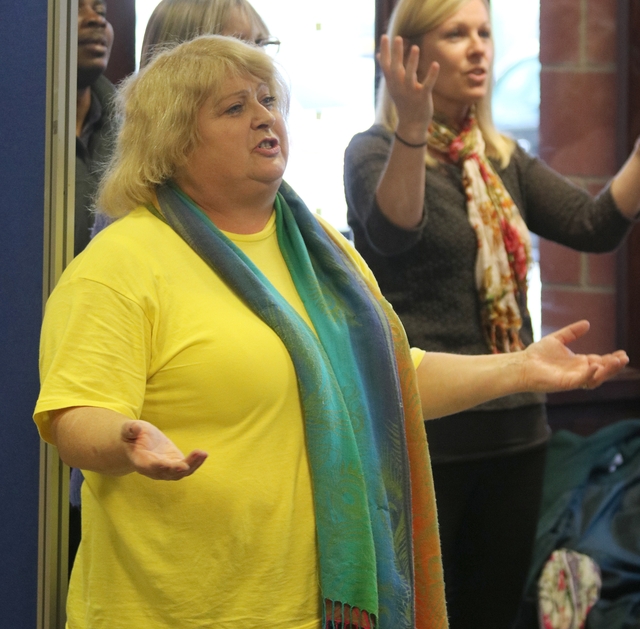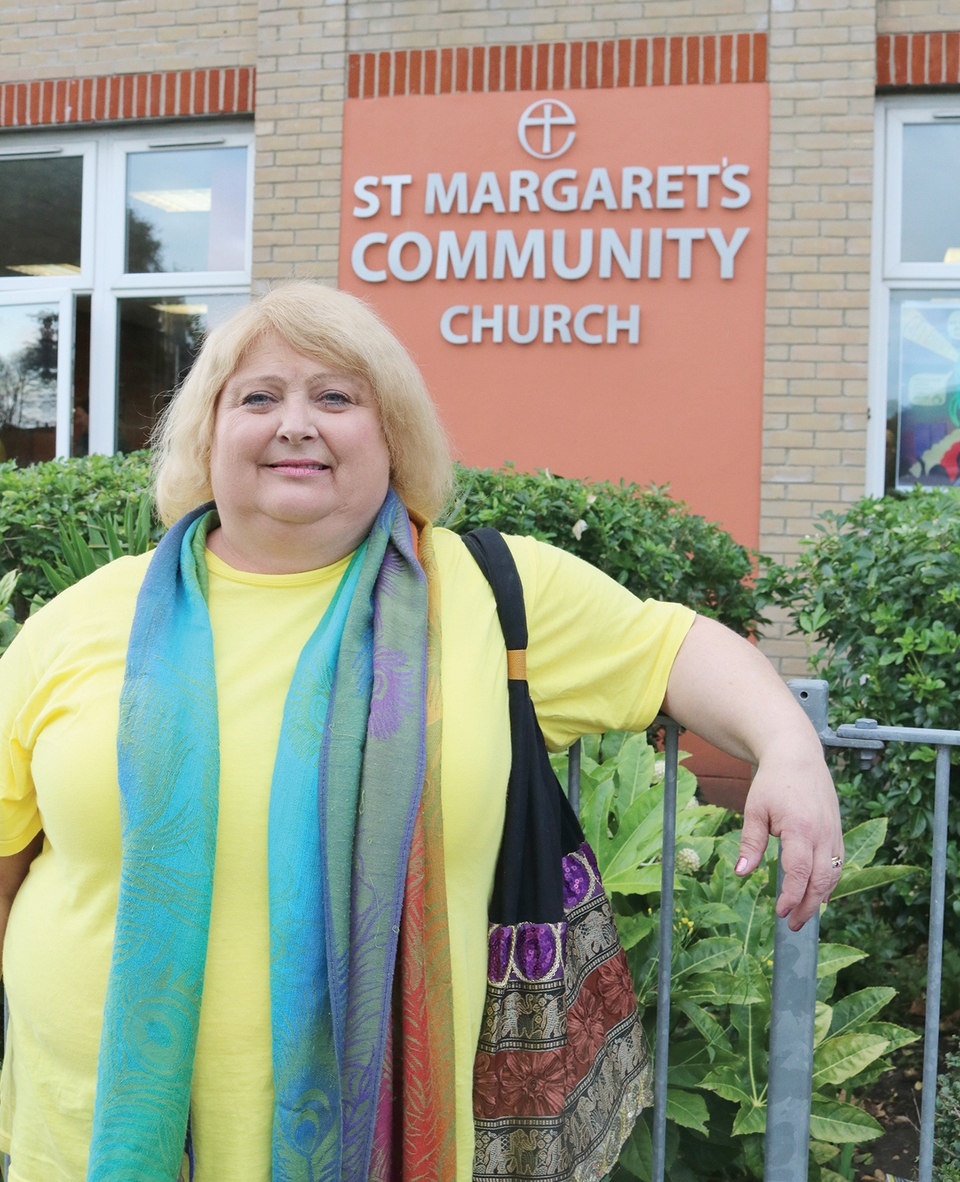Cancer won’t stop me getting ordained

SHE left her beloved Kenya as a child, and has faced clinical depression and cancer – but her faith in God burns brightly.
Jeannette Hayward has spoken to God daily throughout her remarkable life, from her early years in Africa to her current role, training for ordination. Despite being diagnosed with terminal cancer, she’s aiming to be ordained in our cathedral next summer.
And her latest sense of calling is to be part of a team who have planted a brand new congregation in St Margaret’s church hall in Eastney.
She was born in Nairobi, Kenya, in 1957, and among the family’s friends were Joy and George Adamson, whose lives were publicised in the film Born Free.
“It was an amazing family life there; we had a big house, big garden, paddock for horses, chicken, rabbits,” she said. “My mother had a strong faith and we went to Sunday School.”
When Kenya declared independence, Jeanette’s father, a policeman, decided they needed to leave. They crossed the Sahara in a Land Rover, arriving in Southsea where they had family. The family of seven had to adjust from the brilliant sunshine of Africa to living in a Southsea hotel.
Starting at St Jude’s C of E Primary School was a huge shock. With her cut-glass colonial accent and tales of lions and zebras, she was an outsider. “They gave me a good kicking for ‘making up stories’, and called me a liar,” she said.
Being part of St Jude’s Church in Southsea was a comfort, and she felt safe at Sunday School and then the church’s vibrant youth group. But outside church, things were different.
“It was like I had two lives,” she said. “When I was at church I was happy. Everywhere else I was not. I was a really unhappy teenager. I got into all sorts. I had my first pint aged 11. I drank to blot out my unhappiness.
“I was everybody’s agony aunt even then. I used to lead assemblies at school and head up the Christian Education Movement. Apart from RE, I was a nightmare. At 12, I told a teacher I wanted to be a social worker. She said: ‘You’ll never pass an exam in your life.’ I was extremely dyslexic, which no-one had heard of in those days. All my reports said ‘stupid and lazy’.”
She left school at 15 and married Steve aged 18. They had three children Chris, Andrew, and Ellie, but money was always a struggle. She worked full-time, in catering and then as a childminder.
“It put a strain on us,” she said. “We had a very rocky marriage up until about 12 years ago – our 30th anniversary. I was a good listener, but couldn’t listen to myself. I got burnt out with clinical depression in my mid-40s, coping with teenage kids and financial worries.
“Just before our 30th wedding anniversary, I packed my bag and wrote my husband a letter to leave. What helped me was a Christian book I read. I realised I was trying to change him and I that it was me who needed changing. I’d looked to him to meet all my needs, which was totally unfair.”
They enrolled on a marriage course run by nearby St Simon’s Church, which helped to turn things around. They learnt to clear the air together rather than to sulk. The couple now run the marriage course at St Jude’s.
Jeannette worked as Pastoral Care Co-ordinator at St Jude’s Church from 1999 to 2015, when she had to step down because of her health.
“I absolutely loved that job,” she said. “I’d always done voluntary pastoral care – visiting, leading Alpha, speaking at Alpha, and people had always suggested I do it professionally.
“I’ve felt God calling me all my life. I knew friends who’d gone through the training to be ordained and I knew it was very academic and thought I couldn’t do it – because of my dyslexia.
“Then I finally gave in, during one of our vicar’s sermons about taking risks. I realised it was time to leave home – St Jude’s was my home.
Because of my chemotherapy, I had to defer for the first year. Then we started training people via the Portsmouth Pathway which has been able to offer me an accessible and flexible way of training during this demanding period of my life.”

Jeannette had been diagnosed with bowel cancer back in 2007. Surgeons removed part of her bowel and she was in excruciating pain for months afterwards because it had gone gangrenous. She had a 10-20 per cent chance of survival – but mobilised friends and fellow congregation members to pray for her.
“I was about to write letters to my family about dying, but had a sense that God would look after me,” she said. “God filled me with that peace ‘beyond all human understanding’. I’ve felt like that ever since — ten years.”
She survived, but the cancer spread to her lungs, meaning that Jeannette needed more debilitating chemotherapy treatment. Then there was the shock of her husband Steve also being diagnosed with cancer, which meant he was also going through similar treatment.
And after that she was rushed into hospital with acute pain which turned out to be bacterial meningococcal meningitis. She was in a coma for four days, supported by prayer from those in her congregation.
Jeannette is now in the third year of her course, attending training once a week with the Portsmouth Pathway, based at St Luke’s Church. She also spends some weekends studying at Ripon College Cuddesdon near Oxford.
If her health is poor, or she cannot risk infection because of the chemotherapy, she’ll Skype into lectures from home.
Her curacy will be split between St Jude’s Church and the new St Margaret’s Community Church. She’s already preaching at St Margaret’s and St Jude’s, where the team are hoping to open a community café.
“I pray in all sorts of ways, some formal prayers, but some just conversations with God in the car,” she said. “Prayer comes with time and how you’re taught.
“I’ve prayed with a lot of people who are dying. They can be almost comatose but they can say the Lord’s Prayer. It’s one of the last things to go.”
“My April scan showed that the two tumours inside me were shrinking. All the cancer in my lungs has gone. Thanks to God. I still have one on my ribs.”
“Our goal is to see God face to face. It’s awful for those left behind – the pain of separation. But God is a loving God and he can heal the past. He doesn’t change the past, but he can heal it. I believe in miracles—of course.”
“My prognosis is – I’m dying – it’s terminal cancer. But I’m at peace. I’m in God’s hands. I said to God: ‘If I’m dying, give me the grace to die well’. and God replied ‘No I am going to heal you’.”